Japanese has three modes of writing, hiragana, katakana and kanji, whereof the first two constitute the syllable alphabets primarily used for writing grammatical terms, loan words and slang. Kanji on the other hand are characters derived from the Han era hence the term being written in kanji as 漢字 ("Han-era writing"), though the origins of the script is much older as such.
We have been covering Japanese pronouns extensively on this blog and I therefore thought that it might be interesting to look into how writing the first person pronouns in the various scripts effect the way they are perceived and how they may express nuances across various characters and characterisations.
Namely, the pronouns:
Watashi, boku, ore and washi.
Rendering these in the various scripts give associations such as childishness, roughness, fragility, elegance, foreignness, arrogance and so on - so there is plenty to write about.
Watashi:
In kanii - 私:
In kanji, the reading can also be watakushi, the more formal form of this pronoun and also where it etymologically stems from, watashi itself being a shortening.
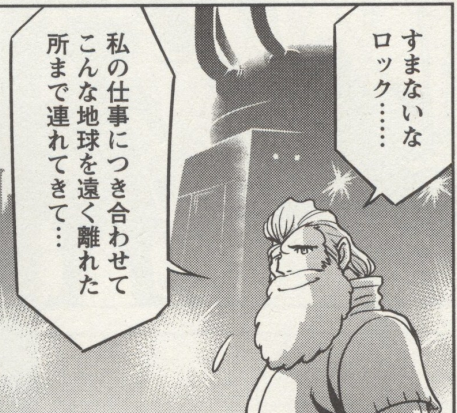
The genial doctor uses the kanji version to express formality, but also maturity in this comic book adaptation whereas he otherwise opts for ワシ (washi) in the game.
In katakana - ワタシ:
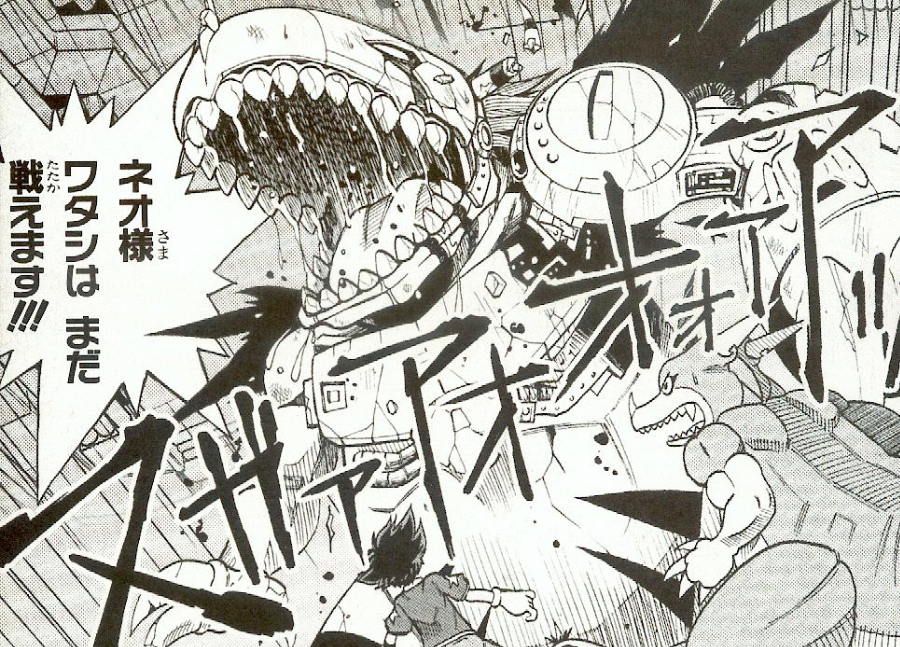
ネオ様 ワタシは まだ 戦います!!!
Neo-sama watashi wa mada tatakaimasu!!!
"Master Neo, I will still fight!!"
The cybernetic dinosaur, MetalGreyMon, otherwise a user of ore (katakana), uses this version of the pronoun to express a rough form of veneration, in part due to his otherwise gruff nature and in part due to the fact that computer speech is usually written in katakana, such as in the case of robots.
in hiragana - わたし:

ひとつのドラゴンボールを わたしたちがみつけてかくしてしまえばあいつらにはぜったいそろえられないんだけど……
Hitotsu no doragonbôru o watashi-tachi ga mitsukete kakushite shimaeba aitsura ni wa zettai soroerarenain dakedo ... ...
"If we hide the Dragon Balls that we discovered then they absolutely will not be able to discover them."
Bulma, one of the original protagonists of Dragon Ball by Akira Toriyama, and a keen scientist, she - at this point in the story - works as technical brains of the journey towards the distant planet of Namek, in order to gather wish-granting orbs called "Dragon Balls."
Her usage of watashi-tachi, the plural form of watashi, is here with hiragana rendered less formal by the switch from kanji to kana-script and also marks it as more informal and in reference to her boisterous personality.
Boku
In kanji - 僕
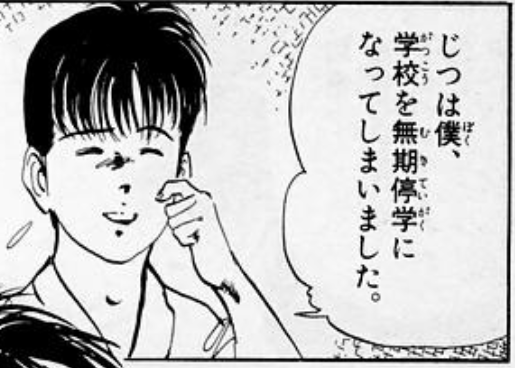
じつは僕、学校を無期停学になってしまいした。
Jitsu wa boku, gakkou o mukiteigaku ni natte shimaimashita.
"The truth is that I am kind of indefinitely and totally suspended from school, sir."
Kenji Gou, a martial arts prodigy, uses boku in the kanji form not only when speaking formally, but also informally, as such the kanji form when paired with keigo (respect speech) gives it a more proper aura versus that of the phonetic kana renderings.
In katakana -ボク
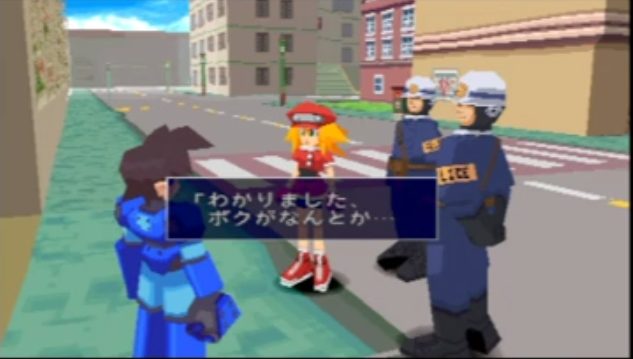
わかりました、ボクがなんとか…
Wakarimashita, boku ga nantoka
"Understood, sir. I will do whatever that I can..."
Rock Vollnut, the hero of the Rockman Dash (Megaman Legends in the West) series uses this pronoun and most often in the katakana script which gives it a young nuance fitting with his character. In his later appearances he uses the kanji version instead:
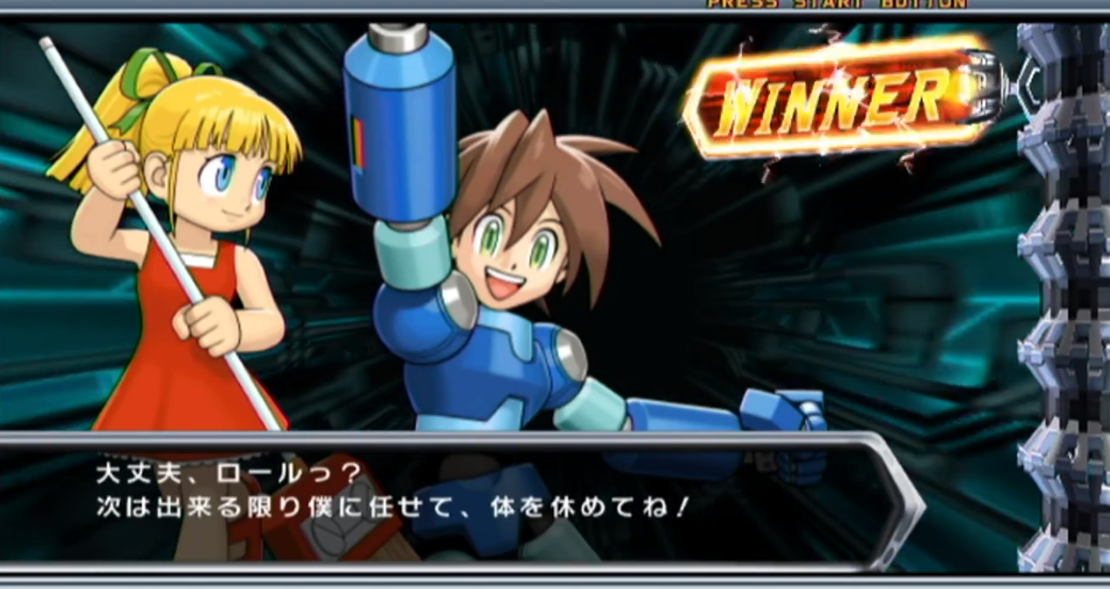
大丈夫、ロールっ? 次は出来る限り僕に任せて、体を休めてね!
Daijoubu, Rôru? Tsugi wa dekiru kagiri boku ni makasete, karada o yasumete ne!
Are you doing okay, Roll? Next time, leave it all to me, you should rest yourself!
Presumably the difference is here that the latter game, the fighting game Tatsunoko vs Capcom, as shown a screenshot from here is a fighting game meant for an older audience hence the usage of kanji spellings over kana ones, where Dash is meant for a much younger demography, who probably cannot all the kanji.
In hiragana - ぼく
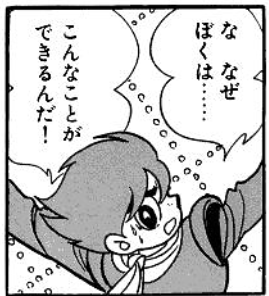
な なぜ、ぼくは…… こんなことができるんだ!
Na naze, boku wa ... ... konna koto ga dekirunda!
Why... Why am I able to perform such things!?"
As noted in a previous article, boku written i hiragana was the standard practice in most manga of the 60s and 70s, as such it also fits with Joe Shimamura, a boy who against his will has been converted into an advanced battle-cyborg in Shoutarou Ishinomori's classic Cyborg 009. Elsewhere the hiragana version is associated with a childish or immature personality and its usage is primarily for younger characters.
Ore
In kanji - 俺
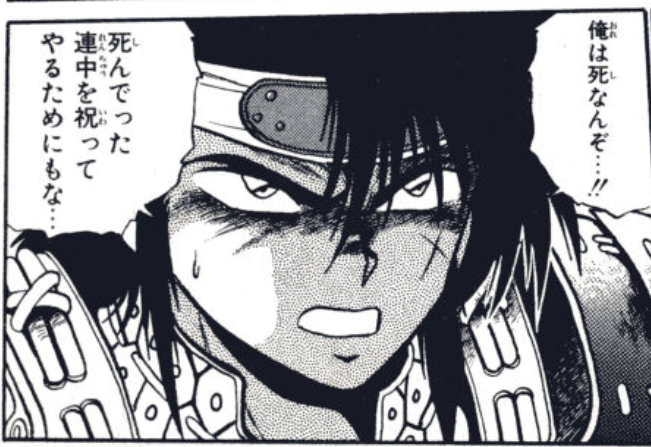
俺は死なんぞ…!! 死んでった連中を祝ってやるためにもな…
Ore wa shinanzo ...!! Shindetta renchuu o iwatte yaru tame ni mo na...
"I have not yet fuckin’ died! For the sake of the happiness of our dead mates, I won’t die!"
The manga Ginga Sengoku Gun'yūden Rai by Jouji Manabe, is a space opera epic spanning over several volumes and charting the rise and fall of its hero Ryuuga Rai, a hotheaded soldier of Danjou Empire's army. Here he is very much not just complaining, but outright furious over the direction of the war. Owing to not just the nature of the work and the older demography, but also to the fact that Rai is not merely a gruff protagonist, he uses both the kanji and katakana variants, the latter when he is truly angry.
In katakana - オレ
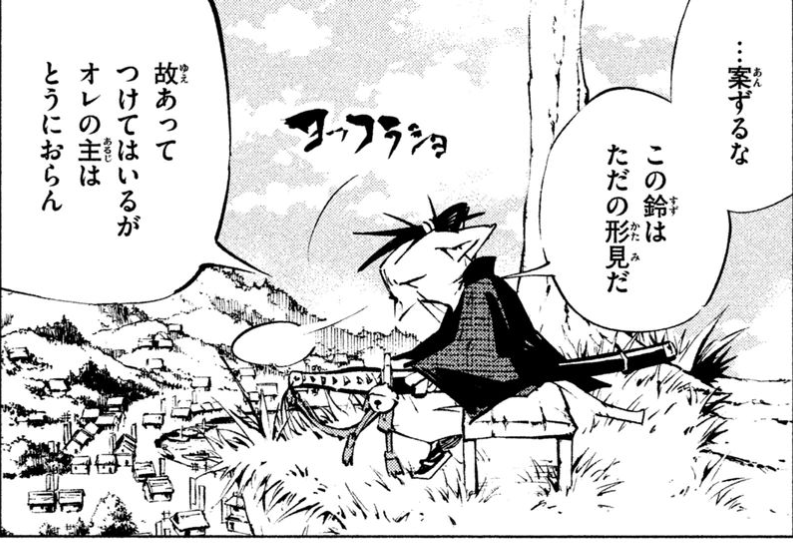
…案ずるな
この鈴はただの形見だ
故あってつけてはいるがオレの主はとうにおらん
...Anzuruna
Kono suzu wa tada no kitami da
Yue atte tsukete wa iru ga oreno aruji ha tou ni oran
"Do not be concerned. This bell is a mere keepsake. I have my cause for doing so, but my master is gone a long while ago."
Norachiyo of the manga Nekogahara, is an anthropomorphic former samurai cat and now roaming ronin, who pursues some unknown mission of vengeance. He is very much a rough cut hero and as such his ore is written in katakana to emphasise this. His vocabulary is in this excerpt not notably vulgar, but quite archaic, notably the existential negation oran; it does however becomes more vulgar later on.
In hiragana - おれ
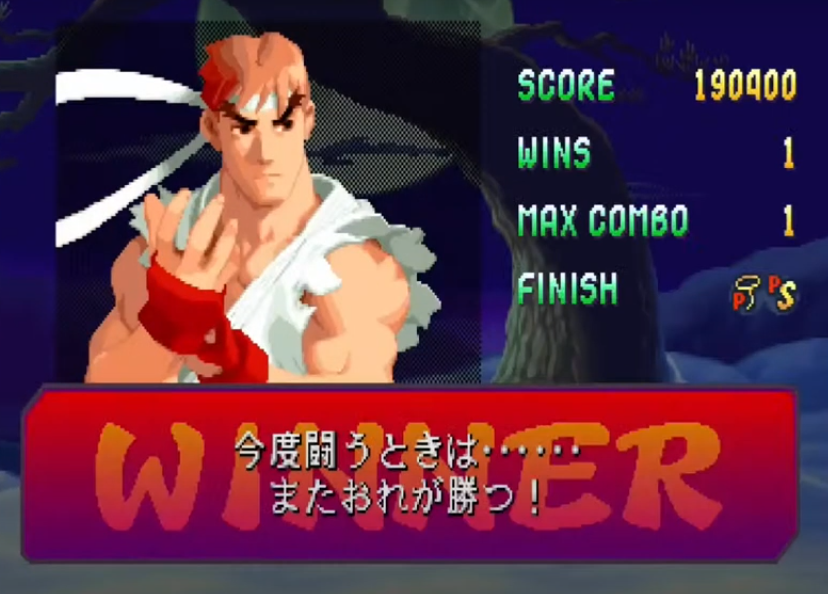
今度闘うときは……またおれが勝つ!
Kondo tatakau toki wa ... ... mata ore ga katsu!
"Fighting this time around... I am again the victor!"
Ryu, the wayfaring martial artist and mascot for the fighting game franchise Street Fighter by Capcom, uses this variety of pronoun, not for the reason of sounding childish nor hyper-informal, but moreover because whereas the other ore-users in the game prefers ore in its katakana form, オレ, Ryu's is おれ in the hiragana due to his personality being a lot less aggressive, but still confident.
Washi
In kanji - 儂
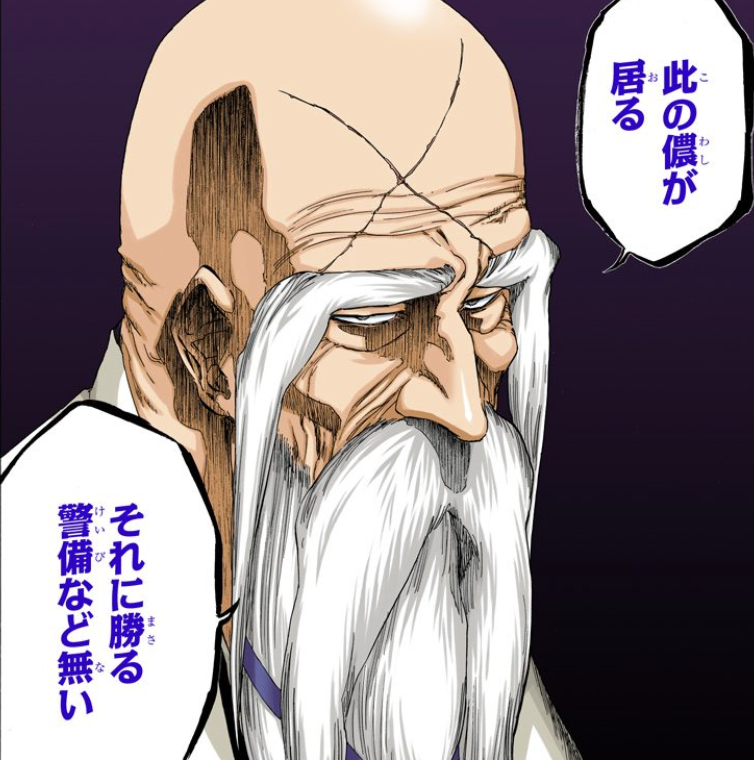
此の儂が居る それに勝る警備など無い
Kono washi ga oru sore ni masaru keibi nado nai
"I am present, thus we need no other superior defence"
Washi is originally an Edo period derivation from watakushi, but used since by both genders, though it chiefly has become the providence of pop-culture and the Hiroshima dialect. Yamamoto Genryusai Shigekuni, the presiding captain general of the Thirteen Court Guard Squads, uses the kanji version of this pronoun, 儂, at all times as does all the characters who use it in the manga, Bleach by Tite Kubo. The usage of the kanji form solidifies the ancientness of the characters themselves, remnants of older times, literally thousands of years old.
In katakana - ワシ
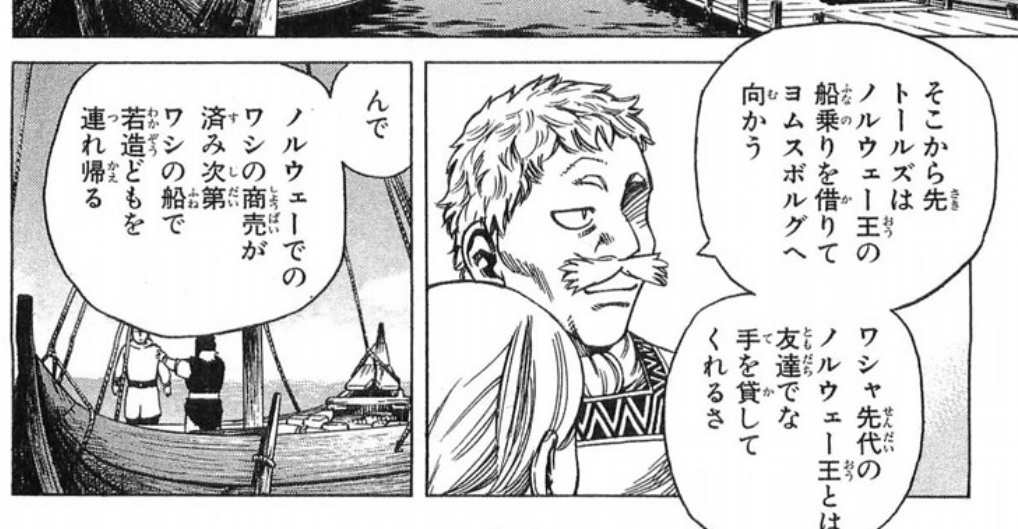
そこから先 トールズはノルウェー王の船乗りを借りてヨムボルゲグへ向かう
ワシャ先代のノルウェー王とは友達では手を貸してくれるさ
んで
ノルウェーでのワシの商売が済み次第 ワシの船で若造どもを連れ帰る
Sorekara saki Tôruzu wa Noruwê ou no funenori o karite Yomuborugu e mukau
Washa sendai no Noruwê ou wa tomodachi de wa te o kashi te kureru sa
Nde
Noruwê de no washi no shoubai ga sumi shidai washi no fune de wakazou domo o tsurekaeru.
"Thence the other point, we shall hire a boatman of the King of Norway to guide us towards Jomsburg. You'll see that I and the king are good friends going far back, he'll lend us a hand. And, as soon as I've taken care of business there, I'll take all the youngsters back home again."
The speaker here is a fictionalised version of the famous Scandinavian explorer and king, Leif the Lucky, starring in the Japanese manga Vinland Saga, itself an adaptation of an Icelandic saga that tells of the voyagers by vikings to North American. He is an elderly gentleman and as such uses washi, his katakana version gives off a carefree and eccentric vibe since the pronoun is usually rendered in hiragana, which fits his personality.
In hiragana - わし
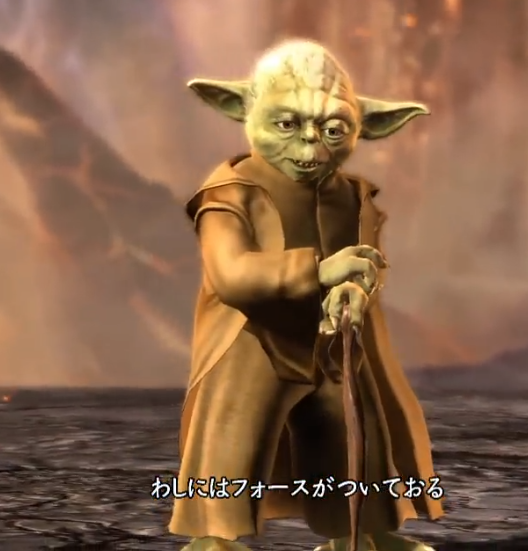
わしにフォースがついておる
Washi ni fôsu ga tsuite oru
"I am wreathed in the Force."
The elderly Jedi-mater Yoda, makes a guest appearance in the Japanese fighting game Soul Caibur IV, hence the original Japanese version features dialogue in the language. As seen above the Grandmaster uses わし (washi) in the hiragana form, befitting his venerable status. His language is otherwise ordinary Hiroshima dialect, unlike the Elizabethan inverted speech of the original.
Coming up next time - We go through additional pronouns and see how they differ in terms of how they are written.